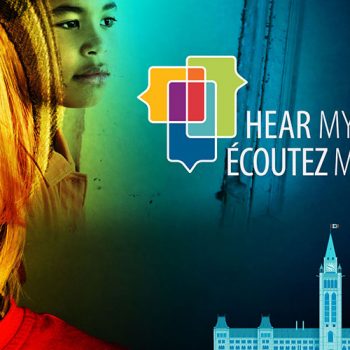Carrying on our legacy – Indigenous feminism
(This is an abridged version of an article first published in the Fall 2016 issue of Geoscope produced by the Quebec Association of Geography Teachers.)
When we wake up each morning, we are given the gift of being descendants of our ancestors with their powerful voices. We have a choice to use that voice in all that we do. Our ancestors set a path for us to understand how all our actions affect every being — whether on the land, in the water, or in the air. They survived, so we can carry on. We have a responsibility to inherit the knowledge of our Elders and restore our culture. We cannot be idle.
These are the fundamental tenets of Indigenous feminism, an all-encompassing feminism which is a way of life carried within our blood by our family and supported by our matriarchal lineage.
Victoria Wahi:ia Ransom’s illustration is based upon the support system of families, friends, and allies of murdered and missing Aboriginal women. The floral pattern is inspired from one of the vamps from Akwesasne. The eagle feather represents the thoughts and prayers that go out to those women who have gone missing to the Creator. Symbolically, the eagle feather offers a support system for the murdered and missing Aboriginal women. The four women with eyes closed represent a process of grieving and healing while the woman looking up represents the journey to ending violence against Aboriginal women.
Indigenous feminism is the movement of Indigenous women re-establishing the knowledge of our elders. We look to the beginning of our creation for guidance and direction. The Sky Woman, creator of our Mother Earth, found strength in her surroundings and grounded herself in the earth. Her connections from her past supported her as she used the tools given by the Creator to empower herself. She is the source of our inspiration and our connection to the Earth and our communities, as we endeavour to pass on her strength to the next generations.
Re-establishing our traditional knowledge includes looking at the way we, women, are treated and represented, and sheds light on the relationships of self and others within our communities. In our culture, men are our partners, our counterparts, not our adversaries. Clans in the longhouse witness the honor, respect and balance between women and men. These values contribute to the foundation of our communities. As women, we set the standards within the Confederacy. We raise the chiefs to leadership, and our bloodlines carry our clans from mother to child. We play an integral role in decision making and child rearing. We educate our sons to respect their mothers. We teach our daughters and nieces to find their voice. Language is powerful, and the manner in which we speak to each other has a great impact on our future.
Indigenous feminism also includes a call for balance and mutual respect amongst our sisters. There must be an emphasis on lifting our spirits up and encouraging healing. Walking With Our Sisters is such a movement of personal and community remembrance and healing.
Our lives are also connected with all of the traumas of the past, done to our people and done to the Earth. And as such, Indigenous feminism is a movement of our women speaking loudly about the impacts of colonization. Our women work to decolonize and restore our traditional knowledge and integrating it into our daily lives. We educate our girls about remaining safe and we take action to create safer spaces for them.



